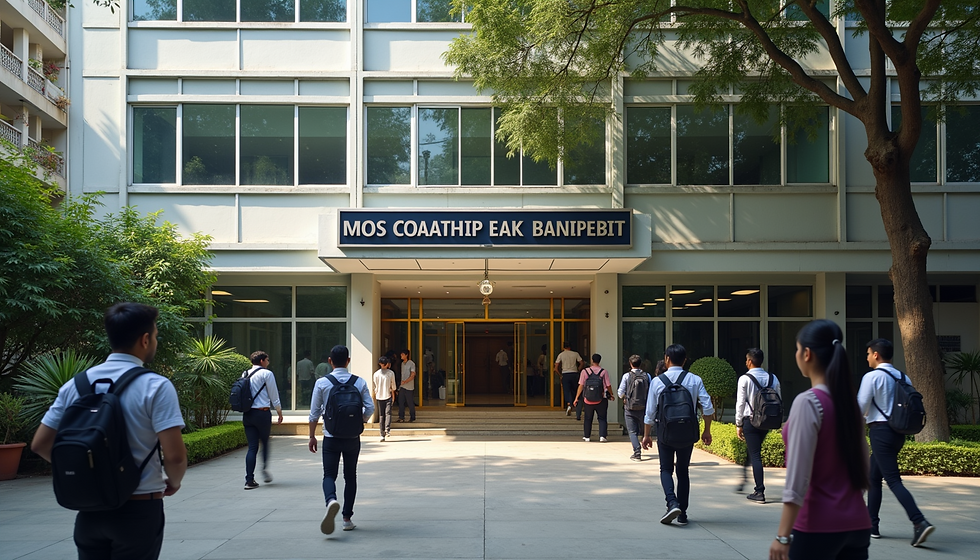The Difficulty of IIT JEE: A Comprehensive Analysis
- TARUN SIR
- Apr 26, 2024
- 3 min read

Introduction to IIT JEE
In the realm of engineering entrance exams in India, the Indian Institutes of Technology Joint Entrance Examination (IIT JEE) stands out as one of the most formidable challenges for aspirants. Known for its rigorous selection process and high standards, cracking the IIT JEE is a dream for countless engineering enthusiasts across the nation.
Understanding the Difficulty Level
The Prestige of IIT JEE
The IIT JEE holds unparalleled prestige in the Indian education system. Securing admission to one of the prestigious Indian Institutes of Technology through this exam is considered a significant achievement, opening doors to promising career opportunities and academic excellence.
Factors Contributing to Difficulty
The difficulty level of IIT JEE can be attributed to various factors, including the vast syllabus, advanced concepts, and the intricate problem-solving skills required in each subject.
Physics: The Achilles Heel
Complex Concepts and Problem Solving
Physics, often dubbed as the Achilles heel of many IIT JEE aspirants, poses significant challenges due to its complex theoretical concepts and intricate problem-solving techniques. From mechanics to electromagnetism, the syllabus demands a deep understanding of fundamental principles and their practical applications.
Need for Deep Understanding
Mere rote learning is insufficient in mastering physics for IIT JEE. Aspirants must cultivate a deep understanding of concepts, enabling them to tackle complex problems with clarity and precision.

Mathematics: The Precision Game
Vast Syllabus and Advanced Concepts
Mathematics in IIT JEE encompasses a vast array of topics, ranging from calculus to algebra and geometry. The syllabus is extensive, covering both basic and advanced concepts that require rigorous practice and thorough understanding.
Application-Based Questions
Unlike traditional exams, IIT JEE tests not only theoretical knowledge but also the ability to apply mathematical concepts to solve real-world problems. This aspect adds another layer of complexity to an already challenging subject.
Chemistry: The Memorization Challenge
Multiple Concepts and Sub-disciplines
Chemistry, with its three distinct branches of physical, organic, and inorganic chemistry, presents a multifaceted challenge to IIT JEE aspirants. Each branch demands a thorough understanding of fundamental principles and their interplay in various chemical reactions and phenomena.
Balancing Theory and Application
While understanding theoretical concepts is crucial, chemistry in IIT JEE also requires the application of these principles in problem-solving. Aspirants must strike a balance between memorization and comprehension to excel in this subject.
Effective Strategies for Tackling Difficulty
Start Early and Consistently
Success in IIT JEE requires early and consistent preparation. Aspirants should commence their studies well in advance, allowing ample time for concept building, practice, and revision.
Practice Regularly and Analyze Mistakes
Regular practice is key to mastering the concepts and problem-solving techniques required for IIT JEE. Additionally, analyzing mistakes and learning from them helps aspirants identify areas of weakness and refine their strategies.
Seek Guidance and Clarify Doubts
Guidance from experienced mentors and teachers plays a crucial role in navigating the challenges of IIT JEE. Aspirants should not hesitate to seek clarification for any doubts or difficulties they encounter during their preparation.
Conclusion
In conclusion, the difficulty of IIT JEE is undeniable, but with perseverance, dedication, and effective strategies, aspiring engineers can overcome these challenges and realize their dreams of securing admission to prestigious institutes. By cultivating a deep understanding of concepts, honing problem-solving skills, and seeking guidance when needed, aspirants can embark on a fulfilling journey towards academic excellence and professional success.
FAQs (Frequently Asked Questions)
Is it necessary to join coaching classes for IIT JEE preparation?
While coaching classes can provide structured guidance and resources, self-study supplemented with quality study material and online resources can also be effective.
How should I balance preparation for board exams and IIT JEE?
It's essential to prioritize effectively and allocate sufficient time for both. Focus on building a strong conceptual foundation for IIT JEE while ensuring adequate preparation for board exams.
What are some common mistakes to avoid during IIT JEE preparation?
Avoiding procrastination, neglecting weaker subjects, and relying solely on rote memorization are common pitfalls. Instead, focus on understanding concepts thoroughly and practicing regularly.
Is it possible to crack IIT JEE in the first attempt?
Yes, many aspirants have successfully cleared IIT JEE in their first attempt through diligent preparation, effective time management, and strategic planning.
How important is mock testing in IIT JEE preparation?
Mock tests are invaluable for simulating exam conditions, identifying strengths and weaknesses, and refining test-taking strategies. Regular mock testing is highly recommended for aspirants aiming to excel in IIT JEE.








Comments